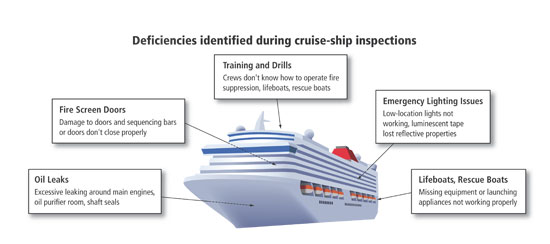Evacuation and rescue of passengers are among the leading problems on a U.S. Coast Guard list of the top 10 cruise ship deficiencies.
In 2014, 425 deficiencies were cited on cruise ships in U.S. waters, according to the Coast Guard Cruise Ship National Center of Expertise in Fort Lauderdale, Fla. The center releases this list annually, highlighting deficiencies the Coast Guard sees during cruise ship inspections.
Fire screen doors not working was first on the 2014 list with 55 instances. Three of the next four deficiencies were problems related to evacuation and passenger rescue: 36 occurrences of problems with lifeboats and rescue boats, 30 occurrences of impeding the means of escape and 25 instances of crew drill and training problems.
Training deficiencies included problems with operating lifeboats and failure to communicate effectively during fire and abandon-ship drills, and crew unable to operate fire suppression systems. Some crews did not have required Standards of Training, Certification and Watchkeeping (STCW) training for crowd control and crisis management.
Andrew O. Coggins, a former chief engineer who is now a cruise industry researcher at Pace University, said he is most concerned with deficiencies that impact evacuation.
“There is a long history of maritime disasters where there were problems with the lifeboats and problems with crew training,” Coggins said.
Crew communication can be critical in an emergency, he said.
“You don’t always have communication with the bridge,” he said. “The crew on site with the boats has to be able to make decisions, or at least be able to evaluate the situation and not tell people it is OK to go back to their cabins when you have a 15-degree list.”
Lifeboat problems included lifeboats not operating properly, missing equipment and davits not working properly.
Brad Schoenwald, the Cruise Ship National Center of Expertise’s senior marine inspector, said the annual list is meant to raise awareness among the operators. Schoenwald said the specific number of deficiencies per ship can be misleading, depending on the problems.
“With ships this big and complex we expect to find deficiencies,” he said.
The goal for cruise ship inspections goes beyond the numbers, he said. The Coast Guard is looking for the root cause of problems.
“Everything we do is linked to the shipboard management practices and how they are fulfilling the requirements of their own safety management systems,” Schoenwald said. “That’s why we phrase our inspection as a holistic exam process. We have to find out why that doesn’t work and why we are the ones that caught it. It’s really about process.”
Impeding means of escape is the biggest concern for Capt. D. Peter Boucher, a former master mariner and cruise ship safety officer.
“This indicates to me that some crewmembers are not paying attention to their daily work procedures throughout the ship,” Boucher said.
Coggins said this can be corrected by making sure that crew check these sites in daily rounds of the ship. As cruise ships have become larger, checking all systems is more challenging.
“As the ships increase in size, the amount of maintenance and all that increases, and it’s not necessarily linearly,” he said. “It can be geometric — you have many more spaces and more area to cover.”
Boucher’s second major concern is problems with drills and training. The vessel’s safety officer must make sure that section leaders are fully trained and that they are conveying this information to each section.
“It is a good practice for the safety officer to pick a different section each week and give them their personal attention and support the authority of the section leader,” Boucher said.
He said crowd control management is a specialized skill that requires formal training.
James E. Hall, safety management consultant and the chairman of the National Transportation Safety Board between 1994 and 2001, said a major problem is a lack of Coast Guard resources.
“The Coast Guard has good intentions, but the Coast Guard does not have the manpower (or the) training to ensure the safety of these floating cities,” he said. The Coast Guard “at a minimum probably needs twice the number of people they have dedicated to this responsibility than they presently have.”
Schoenwald said Coast Guard policy requires a minimum of three foreign-passenger-vessel examiners on each exam plus a port-state-control-qualified examiner who conducts the administrative and navigation parts on the bridge. If that unit does not have three examiners, they get help from neighboring units or the Cruise Ship National Center of Expertise. This center was created to focus on cruise ships because of how complex and large they are.
Additional deficiencies on the 2014 list were: 30 occurrences of the improper use of categorized spaces such as storage of combustible material in areas without proper fire suppression; 17 cases of problems with fire detection equipment, such as smoke detectors not working; and nine occurrences of problems with fire suppression systems, such as fire pumps not starting automatically and various issues with section valves and CO2 systems.
The last three deficiencies included nine occurrences of problems in engine room spaces, such as oil leaks around the main engine room space, leaks in the oil purifier room and shaft seal leaks; eight examples of problems with pollution prevention equipment, such as leaks in piping at bunkering stations, issues with the marine sanitation device and problems with the oily water separator and its associated plumbing; and seven occurrences of emergency lighting issues, such as low location lighting.
In most cases, the deficiencies were corrected before the examiner finished the inspection, the Coast Guard said.
 |
|
Problems with fire safety, crew training and evacuation equipment were highlighted in the U.S. Coast Guard’s list of cruise-ship deficiencies most frequently found during inspections. |
|
Pat Rossi illustration/Source: U.S. Coast Guard |
